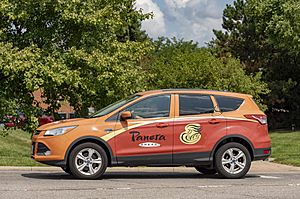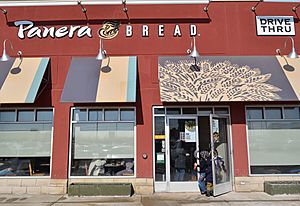Panera Bread facts for kids
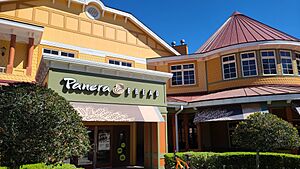
Panera Bread in The Villages, Florida
|
|
| Private | |
| Industry | |
| Genre | Fast casual |
| Founded | St. Louis Bread Co.: 1987 Kirkwood, Missouri, U.S. Panera Bread: 1997 St. Louis, Missouri, U.S. |
| Founder | St. Louis Bread Company: Ken Rosenthal and Linda Rosenthal Panera Bread: Louis Kane and Ronald M. Shaich |
| Headquarters | Fenton, Missouri,
United States
|
|
Number of locations
|
|
|
Area served
|
|
|
Key people
|
Ronald M. Shaich – founder and chairman Ken Rosenthal – founder of The St. Louis Bread Company Paul Carbone – CEO (2025–present) Charles J. Chapman, III – executive VP and COO Sue Morelli – president of Au Bon Pain |
| Products | Bakery-café serving several varieties of bread – |
| Revenue | |
| Total assets | |
| Total equity | |
|
Number of employees
|
About 140,000 |
| Parent | JAB Holding Company |
| Subsidiaries | Paradise Bakery & Café |
Panera Bread is an American chain of bakery-café restaurants. It has over 2,000 locations in the United States and Canada. A bakery-café is a type of restaurant that sells fresh bread, pastries, sandwiches, and coffee. Panera is known for being a "fast casual" restaurant, which means it offers quick service like a fast-food place but with higher quality food.
In the area around St. Louis, Missouri, the company is called by its original name, Saint Louis Bread Company. Panera offers many baked goods like bagels, cookies, and croissants. It also has a full menu with salads, soups, sandwiches, and pasta.
Panera is owned by a company called JAB Holding Company. For many years, Panera was famous for offering free Wi-Fi to its customers.
Contents
How Panera Bread Began
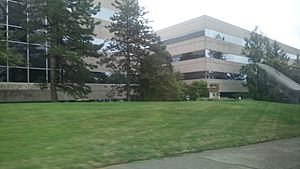
In 1987, Ken and Linda Rosenthal started the St. Louis Bread Company in Kirkwood, Missouri. Ken was inspired after visiting a sourdough bakery in San Francisco. He trained for a year to learn how to make sourdough bread. The first restaurant was opened with a $150,000 loan from the Small Business Administration.
In 1993, a company called Au Bon Pain Co. bought the St. Louis Bread Company for $23 million.
Four years later, in 1997, the company changed its name to Panera. The name "Panera" comes from a Latin word that means "breadbasket." Even with the new name, the restaurants in the St. Louis area kept the original name.
To focus on growing Panera Bread, the company sold Au Bon Pain in 1999.
Growing and Changing
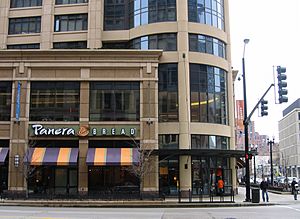
Over the years, Panera Bread grew and made many changes. It bought other bakery chains and expanded into new areas.
New Restaurants and Ideas
In 2007, Panera bought a majority share of Paradise Bakery & Café, another bakery chain. By 2009, it owned the entire company. Later, in 2015, all Paradise Bakery & Café locations were changed into Panera Bread restaurants.
Panera expanded into Canada in 2008, opening its first restaurants in the Greater Toronto Area.
In 2016, Panera opened its 2,000th restaurant in Elyria, Ohio. The company also bought a majority share in Tatte Bakery & Cafe, a popular bakery chain in the Boston area.
Using Technology for Orders
In 2014, Panera introduced "Panera 2.0." This included new technology to make ordering easier. Customers could use tablets, called Fast Lane kiosks, to place an order without waiting in line. They could also order from an app on their phones.
By 2017, online and mobile orders made up over 26% of the company's sales. The next year, Panera started its own delivery service, creating thousands of new jobs.
In 2022, the company began testing artificial intelligence (AI) to take orders in the drive-thru at some locations. This technology helps make ordering faster and more accurate.
Company Changes and New Foods
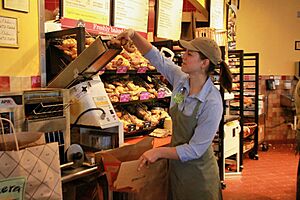
In 2017, Panera announced that its food menu was free of artificial colors, flavors, sweeteners, and preservatives. That same year, a large company called JAB Holding Company bought Panera for $7.5 billion.
In 2020, Panera added pizza to its menu to give customers more dinner choices. The next year, Panera joined with Caribou Coffee and Einstein Bros. Bagels to form a new, larger company called Panera Brands.
In 2024, Panera began changing how it makes its bread. Instead of baking it fresh from dough each day, restaurants started receiving partially baked frozen bread. They finish baking it in the store. This change led to the closing of some dough-making facilities.
Ken Rosenthal, the founder of the St. Louis Bread Company, died in February 2025 at the age of 81. A month later, in March 2025, Paul Carbone became the new CEO of Panera.
Helping the Community
Panera has been involved in several projects to help people and the environment.
Panera Cares Restaurants
In 2010, Panera started a nonprofit project called Panera Cares. These were special restaurants where customers could "Pay what you can." This meant people could pay what they could afford for their meal, even if it was less than the normal price. Some customers would "pay it forward" by donating extra money to cover meals for others.
These restaurants were located in cities like St. Louis, Chicago, and Boston. The last Panera Cares location closed in 2019.
Caring for Animals and the Planet
In 2015, Panera promised to use only cage-free eggs in all of its stores by 2020. The company also added more plant-based foods, like edamame and organic quinoa, to its menu.
Panera also has a "Cool Food" pledge to help fight climate change. It labels menu items to show customers which choices are better for the environment. Foods with a green label are the most climate-friendly.
Giving Back to Local Areas
Through its Day-End Dough-Nation program, Panera donates unsold bread and baked goods to local food banks and charities. The company gives away about $100 million worth of unsold food every year.
See also
 In Spanish: Panera Bread para niños
In Spanish: Panera Bread para niños
- List of bakeries
- List of fast food restaurant chains
- List of restaurant chains in the United States


